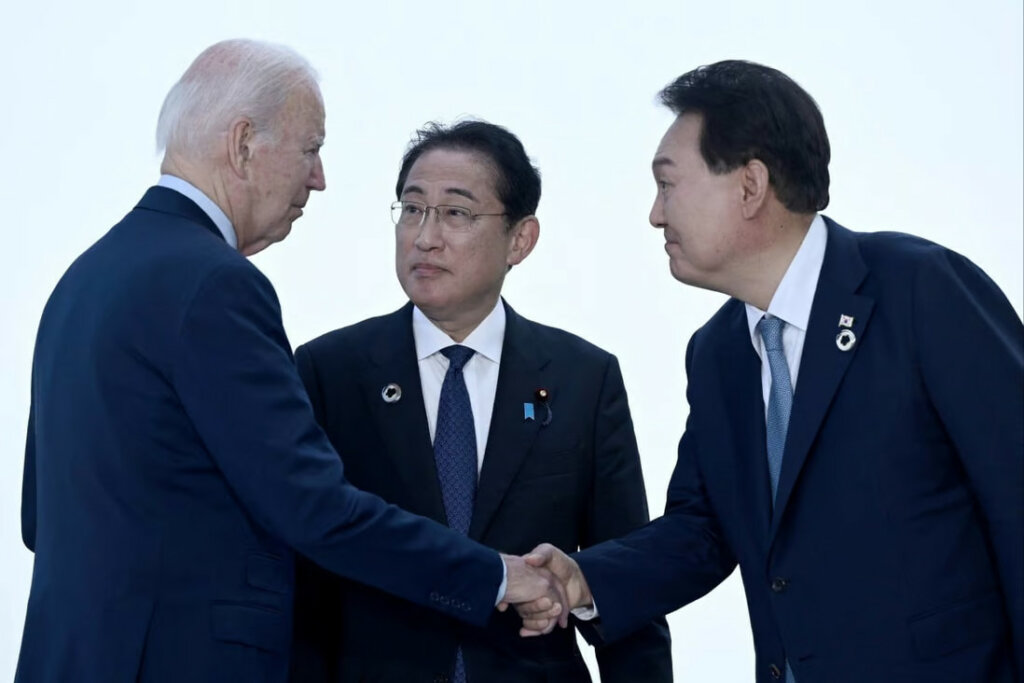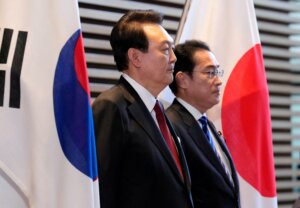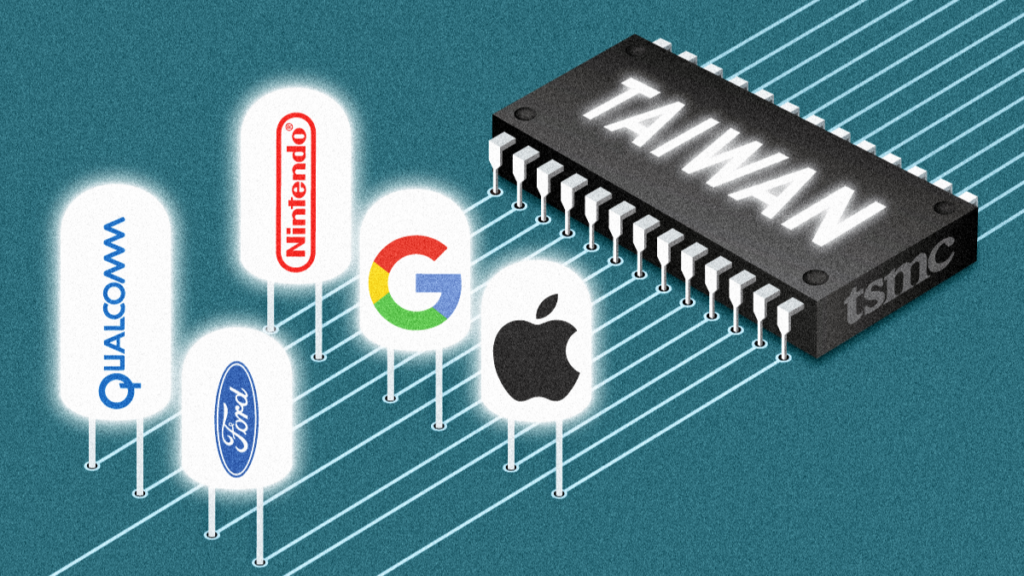
America, Japan and South Korea are bunking together – it isn’t summer without camp!
Officials say leaders from the United States, Japan and South Korea are meeting at Camp David to launch new defense steps. The three countries will launch a series of joint initiatives on technology and defense this Friday.
US officials, speaking to Reuters on condition of anonymity, said the summit will see the three leaders agree to a mutual understanding about regional responsibilities amid mounting shared concerns about China.

US President Joe Biden will host at his presidential retreat. Photo: AFP.
A three-way hotline will be set up to communicate in times of crisis, but the summit is unlikely to produce a formal security arrangement that commits the nations to each other’s defense.
US President Joe Biden invited Japanese Prime Minister Fumio Kishida and South Korean President Yoon Suk Yeol, to the storied presidential retreat in Maryland’s Catoctin Mountains.

Camp David’s a little better than cabins in the woods. dapd via AP, FILE
For the two Asian nations, the trip will be part of their work to mend tattered diplomatic relations in the face of a greater regional threat posed by both China’s rise and North Korea. US officials hope this will be the first of many meetings, to become an annual gathering between the three leaders.
The summit on Friday will also see the three leaders signal deeper cooperation in areas including cybersecurity and supply chain resilience.
In March this year, South Korea and Japan held their first summit in 12 years. The meeting this week will mark another step towards easing tensions between the two states after years of dispute.

Photo via Reuters.
Washington has formal collective defense arrangements in place with Tokyo and Seoul separately, but wants the two countries to work more closely with one another in the face of China’s mounting power.
“We are anticipating some steps that will bring us closer together in the security realm,” said one of the U.S. officials, and that doing so would “add to our collective security.”
But the U.S. official added that, “it’s too much to ask – it’s a bridge too far – to fully expect a three-way security framework among each of us. However, we are taking steps whereby each of the countries understand responsibilities with respect to regional security, and we are advancing new areas of coordination and ballistic missile defense, again technology, that will be perceived as very substantial.”
It’s likely that a joint statement between the three countries will come out of the summit. It will include language speaking to concerns about China’s desire to change the status of Taiwan, which it claims as its own territory.

Taiwan’s TSMC powers the chip industry. © Illustration by Michael Tsang via Financial Times.
The language used will have to be consistent with previous US positions on the subject, avoiding an escalation in rhetoric that would undermine efforts to ease tensions ahead of potential talks between Biden and Chinese President Xi Jinping.
Christopher Johnstone, a former Biden White House official now with Washington’s Center for Strategic and International Studies think tank, told Reuters he expected a summit statement recognizing that the security of the three countries is linked, “and that some measure of threat to one is a threat to all,” even if this would fall short of NATO’s Article 5 language, that sees an attack on one as an attack on all.
All of this comes after a collaboration between the Chinese and Russian militaries that unsettled the US.
The South China Morning Post reports that China is on “high alert” as Biden hosts – building what some have called a “de facto Asian Nato.”
Some are saying that, given the integration of the Asian countries’ economies with China, they have no intention of picking sides between Beijing and Washington.
For the Japanese government, the alliance with the U.S. is an easy tool for concrete interests, and a condition in exchange for Washington’s support on international issues.
Of course, all of this is happening amidst the silicon blockade imposed on China by America. Beyond maintaining US primacy in the tech world, the effects will cut into Chinese military advancements, and threaten its economic growth and scientific leadership.
As a result, China is working hard to develop its own domestic semiconductor industry, leading to increased competition and vulnerabilities in the software supply chain, too.
This could result in increased attacks on the U.S. supply chain and attempts to gain access to U.S. suppliers’ networks and facilities to both exfiltrate intellectual property and introduce malicious code or components into the supply chain.
“Another potential risk is that this increased competition could lead to the fragmentation (or Balkanization) of the global cybersecurity ecosystem, with different regions using different standards and technologies,” said Ted Miracco, CEO at Approov.
It’s likely that the closeness between the US, Japan and South Korea will include moves to universalize their technological aims and defenses to avoid any such fragmentation. Until a statement from the three leaders, all anyone can do is watch and wait.









